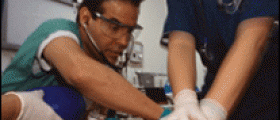
Septic Shock - Overview
Septic shock is a life-threatening medical condition which features with fatal drop in blood pressure and malfunction of numerous organs. It requires prompt medical help and if not treated timely may cause lethal outcome. Septic shock represents whole body inflammation and is a consequence of bacterial infection. Bacterial infection may initially affect each part of the body and it only leads to septic shock once the bacteria have entered the blood stream. Symptoms of sepsis include pale and cold extremities, increased or rather low body temperature accompanied by chills, hotheadedness, low blood pressure, rapid heart rate and palpitations, shortness of breath, skin rash and discolorations and in progress of the disease the patient may become restless, lethargic, and confused.
The actual cause of sepsis and septic shock is reaction of body's immune system to the presence of bacteria in blood. The immune system overacts and the symptoms of the disease occur due to increased reaction of the immune system. In septic shock low blood pressure causes insufficient supply of organs with oxygen and other nutrients and the patient develops multiple organ failure. Some believe that immune system induces production of certain substances which cause dilatation of blood vessels and consequently lead to drop in blood pressure. Furthermore, in septic shock immune system is in charge with formation of blood clots. And finally, damage is caused by direct effects of bacterial toxins. All of the previously mentioned is responsible for multiple organ damage. Some people who are already suffering from certain illnesses are more susceptible to septic shock. They include diabetes, lymphoma, HIV patients, recent surgery and so on.
Septic Shock Treatment
Septic shock is diagnosed with a blood test which points to infection. Levels of oxygen are reduced and numerous tests show different organ failure. The goal of the therapy is to support the failure of the affected organs.
Those patients whose respiratory function is severely damaged are put on a ventilator. All the drugs are administered intravenously. Medications are given to lower the infection, stabilize blood pressure and treat hypercoagulation. Patients are also given intravenous fluids which can help in bringing of blood pressure under control. In kidney failure dialysis is performed. And finally, in some cases septic shock treatment includes surgical procedures which remove the dead tissue or drain abscesses which have been the actual cause of the sepsis.
Today doctors may administer new drugs that are rather successful in fight against extreme inflammatory response. These drugs can limit the extent of organ damage. Hemodynamic monitoring is essential and it includes evaluation of the pressure in the heart and lungs.









-Arthritis_f_280x120.jpg)







Your thoughts on this
Loading...